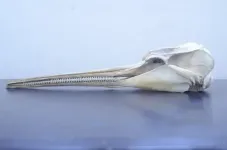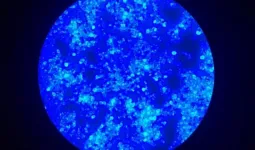(Press-News.org) PULLMAN, Wash. - You can take a fish out of toxic water, but its epigenetic mutations will remain for at least two generations.
A research team led by Washington State University scientists analyzed the epigenetics--molecular factors and processes that determine whether genes are turned on or off--of a group of Poecilia mexicana fish, or Atlantic molly, that live in springs naturally high in hydrogen sulfide, which is normally toxic to most organisms.
The researchers removed a sample of fish from the toxic water and bred them in freshwater. They found that the grandchildren of the sulfidic-adapted fish had more epigenetic marks in common with their wild, toxic-water-living grandparents than other Atlantic molly that had always lived in freshwater.
"After two generations in laboratory conditions, the fish generally retained their same epigenetic marks, which was really unexpected," said Joanna Kelley, WSU associate professor of evolutionary genomics and a corresponding author on the study published in Proceedings of the National Academy of Sciences. "In an evolutionary context, the study shows that these epigenetic marks are fairly stable."
Hydrogen sulfide is found in nature and as a by-product generated by many human activities, such as paper manufacturing, sewage treatment and gas exploration. For most animals, including humans, it is usually toxic at relatively low concentrations and fatal at high levels. Yet some populations of Atlantic molly have adapted to living in springs with high levels of hydrogen sulfide, while other groups of the same species have remained in freshwater. To Kelley and her colleagues, these fish presented a natural experiment to help address questions of how evolutionary adaptations occur.
For this study, Kelley collaborated with WSU environmental epigenetics and reproductive biologist Michael Skinner, to do the epigenetic analysis. The researchers raised a sample of sulfidic and non-sulfidic fish in freshwater environments. When the fish produced two generations of offspring, they measured their epigenetic similarities, specifically regions of DNA methylation, a type of chemical modification that can regulate gene expression, turning a gene on or off, without changing the DNA sequence string itself.
They found that the grand-offspring of the sulfidic fish had an 80% overlap in DNA methylation regions with the grandparent fish--even though they had been raised in freshwater. This compares to only 20% overlap with the non-sulfidic fish that had always lived in freshwater.
"It's really one of the first examples where we've taken an organism out of its normal environment and put it into a different environment and showed that the epigenetics keep being inherited going forward," said Skinner, also a corresponding author on the paper.
The study also adds to evidence from previous animal research showing that exposure to toxins has epigenetic effects that can last for generations. Skinner's lab has conducted studies on other wild species, including Darwin Finch in the Galapagos and the New Zealand mud snail as well as laboratory animals, showing that epigenetic changes resulting from environmental toxicants are passed down.
"This is not a one-off, unique species event. This has an impact on everything, including humans," said Skinner. "Although this is an animal model, it's a demonstration of how an environmental toxicant can actually shift the epigenetics, and it becomes programmed for subsequent generations."
INFORMATION:
EVANSTON, Ill. --- The human gut is more than a source of instinct.
A new Northwestern University study is the first to explicitly address the gut microbiome as a pathway to understanding how environmental inequities could lead to health disparities.
Biological anthropologist Katherine Amato, assistant professor of anthropology at the Weinberg College of Arts and Sciences at Northwestern, is the study's lead author.
Amato says, despite a rich body of literature documenting environmental impacts on the microbiome, and the microbiome's impact on human health, ...
International team used the stomach bacteria Helicobacter pylori as a biomarker for ancient human migrations
DNA sequences catalogued at University of Warwick in EnteroBase, a public genomes database, demonstrate that a migration of Siberians to the Americas occurred approximately 12,000 years ago
Project began in 2000s but new statistical techniques allowed researchers to reconstruct and date the migrations of Siberian Helicobacter pylori
Early migrations of humans to the Americas from Siberia around 12,000 years ago have been traced using the bacteria they carried by an international team including scientists at the University of ...
Certain patients with an aggressive form of ovarian cancer have a better chance of a cure through surgical removal of their tumor before chemotherapy instead of the reverse, a new study shows.
Led by researchers at NYU Grossman School of Medicine, Perlmutter Cancer Center, and Dana-Farber Cancer Institute, the study used a mathematical tool to examine how doctors should coordinate available treatments for high-grade serous ovarian cancer (HGSC).
Ovarian cancer is the 8th most common cancer and cancer death in women worldwide, and HGSC constitutes roughly 70 percent of ovarian malignancies and has the worst prognosis. Patients with the condition typically undergo surgery and chemotherapy, but there has been long-standing controversy over the best order of treatment.
Published ...
A study of woodland ecosystems that provide habitat for rare and endangered species along streams and rivers throughout California reveals that some of these ecologically important areas are inadvertently benefitting from water that humans are diverting for their own needs. Though it seems a short-term boon to these ecosystems, the artificial supply creates an unintended dependence on its bounty, threatens the long-term survival of natural communities and spotlights the need for changes in the way water is managed across the state.
"We need to be more intentional in incorporating ecosystem water needs when we manage water--both for aquatic organisms and species on land," said Melissa Rohde, the lead author of a study published June ...
The concentration of potentially toxic metals is increasing in the population of the franciscana dolphin --a small cetacean, endemic from the Rio de la Plata and an endangered species-- according to a study led by a team of the Faculty of Biology and the Biodiversity Research Institute (IRBio), published in the journal Science of The Total Environment.
The impact of human activity in the region could be the cause for the increase of trace elements such as chromium, copper, iron and nickel in the dolphins' biological tissues, as stated in the study. The paper counts on the participation of members from the National History Museum of Uruguay, and is subsidized through a project of ...
LAWRENCE -- The United States has the highest population of incarcerated citizens among developed nations. Every year, roughly 2 million women, the majority held in jails, leave incarceration. The COVID-19 pandemic hit jails and correctional facilities harder than almost any other societal setting. Many of the people leaving incarceration are returning to communities that were also disproportionately affected by the pandemic, yet many people in that population have expressed hesitancy to receive a COVID-19 vaccine.
New research from the University of Kansas found high rates of vaccine hesitancy among women transitioning from incarceration, due to a multitude ...
Syracuse, N.Y. - A study of nearly 550 adults with intellectual and developmental disabilities receiving residential services in New York City found that age, larger residential settings, Down syndrome and chronic kidney disease were the most common risk factors for COVID-19 diagnosis, and heart disease was most associated with COVID-19 deaths.
The study, "Risk Factors Associated With COVID-19 Outcomes Among People With Intellectual and Developmental Disabilities Receiving Residential Services," was published June 8 by JAMA Network Open and provided the first evidence of the risk factors leading to COVID-19 diagnosis and death among people with IDD who receive residential services.
The study's findings suggest that ...
Fully occupied intensive care units (ICUs). Physically and mentally exhausted health workers. Chaotically overcrowded hospitals. These and similar problems posed by the COVID-19 pandemic in Brazil have created ideal conditions for the emergence of Candida auris, a microorganism some are calling a "superfungus" because of the speed with which it has developed drug resistance.
The first two cases were confirmed in December 2020 at a hospital in Salvador (state of Bahia, Northeast Brazil), and are described in the Journal of Fungi by a group of researchers led by Arnaldo Colombo, head of the Special Mycology Laboratory at the Federal University of São Paulo (UNIFESP). The study was supported by São Paulo Research Foundation - FAPESP.
"Nine other C. auris patients ...
TROY, N.Y. -- The future of quantum computing may depend on the further development and understanding of semiconductor materials known as transition metal dichalcogenides (TMDCs). These atomically thin materials develop unique and useful electrical, mechanical, and optical properties when they are manipulated by pressure, light, or temperature.
In research published today in Nature Communications, engineers from Rensselaer Polytechnic Institute demonstrated how, when the TMDC materials they make are stacked in a particular geometry, the interaction that occurs between particles gives researchers more control over the devices' properties. Specifically, the interaction between ...
A discovery from researchers at the University of Illinois Chicago may lead to new treatments for individuals who suffer from alcohol use disorder and depression.
The study, "Transcriptomics identifies STAT3 as a key regulator of hippocampal gene expression and anhedonia during withdrawal from chronic alcohol exposure," is published in the journal Translational Psychiatry by researchers at UIC's Center for Alcohol Research in Epigenetics.
"During withdrawal from long-term alcohol use, people often suffer from depression, which may cause them to start drinking again as a way to self-medicate. If we ...


